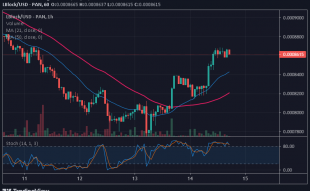Join Our Telegram channel to stay up to date on breaking news coverage
Since 2009, Bitcoin, often known as digital gold, has been declared dead at least 458 times. However, Bitcoin proved to be alive and well each time.
The price of Bitcoin (BTC) reached $17,000 during the most recent drop, its lowest level since late 2020. According to Google Trends data, ‘Bitcoin is Dead’ is started to trend again, reflecting the prevailing sense of unease among investors in the cryptocurrency sector.
Your capital is at risk.
Experts Take On ‘Why Did Bitcoin Crash’
In March, CNBC reported that the Federal Reserve had authorized the first rate rise in three years, which was the catalyst for Bitcoin’s decline from its November record high.
This one act became a significant turning point, exerting downward pressure on risk assets such as Bitcoin. In the meanwhile, a variety of other events, including as Russia’s invasion of Ukraine and the Terra crash, also contributed to the collapse of Bitcoin.
Rob Schmitt, chief operating officer of infrastructure provider Toucan, claimed that a mix of macro challenges, including as rising interest rates and geopolitical unpredictability, has generated a larger market collapse that has led to a significant delegating event in crypto markets.
Specifically, the implosion of Terra and the subsequent insolvency of Celsius and Three Arrows Capital have necessitated the liquidation of vast quantities of BTC, which has equally contributed to the price drop.
First Digital global digital payments business CEO Vincent Chok stated that this is a part of the usual market cycle and that the fundamental reason for the fall was not geopolitical turmoil but rather the collapse of Luna Classic (LUNC). The fall also resulted in margin calls for hedge funds and positions with specified liquidity.
Chok added that it is part of the industry’s super cycle, so a bull run is in the pipeline as per certain technical analysis.
Crypto Doomsday Ahead?
Bitcoin‘s demise has been predicted at least 458 times in the past. Each time, though, it has managed to return to life.
Kevin Owocki, the founder of Gitcoin DAO – a platform for supporting open source Web3 applications — refutes these baseless claims, stating that Bitcoin has been pronounced dead hundreds of times in the past, and these predictions have always been incorrect.
The historical pattern followed by the growing public interest in this market has debunked these claims. In a nutshell, Bitcoin is neither dead nor dying. Bitcoin is here to stay.
Focus Shifts on Web3
Owocki’s focus has always been on the future of what Web3 will be able to develop and how these tools will bring solutions to the global challenges that mankind confronts. There have been instances in the past when the value of digital assets fell to uncomfortably low levels, but investors have seen that the crypto community emerges from these situations more robust and resilient.
He goes on to explain that he has a positive perspective that the market will recover and that the assets will be value creators not only for Web3, but for the future as well.
In addition, Schmitt asserted that a momentary decline in Bitcoin’s price has no substantial influence on the cryptocurrency. He added that Bitcoin had experienced numerous greater declines in the past. Several other on-chain measures indicate that Bitcoin will likely emerge from its current predicament. Important metrics include the 200-week moving average.
Moving average has been a reliable indication of BTC price for a very long time. In the past, if Bitcoin reached the 200-week moving average, it totally rebounded. Bitcoin occasionally fell slightly below the 200-week moving average, but it never remained there for very long.
Bitcoin’s current trading range is quite near to its 200-week moving average; hence, there may be grounds to assume that Bitcoin is not dead. In fact, a rise is anticipated in the near future.
How Has Cryptocurrency Affected the Economy?
Institutional investors’ active interest in the last bull cycle of the cryptocurrency market has generated concerns that the larger economy may be harmed. Many businesses have been forced to lay off a significant number of staff, while others are contemplating insolvency. In addition, a recent Pew Research Center poll indicated that around 16% of U.S. citizens had been connected with bitcoin in some capacity.
Thus, there is a degree of national exposure to the current state of the cryptocurrency market. However, not everyone feels that the current state of the cryptocurrency market will affect the economy as a whole.
In an interview with CNBC, Joshua Gans, an economist at the University of Toronto, clearly voiced his opinion that crypto is not typically used as collateral for real-world loans. Without that, these are only paper losses. This is why this is low on the list of economic concerns.
Despite the current bearish forecast for the crypto sector, crypto continues to enjoy widespread acceptance. With greater participation from sports groups, private persons, business institutions, and even state and federal governments, the trend of crypto acceptance is evident.
Axios, a news company located in the United States, reports that the annual increase in crypto app downloads might be attributable to increased media attention. While there was a 64% increase in the number of crypto applications downloaded in 2021, there was a 400% increase in the number of crypto apps downloaded in 2019. Over the next four years, crypto partnerships with sports companies, teams, and leagues are projected to exceed $5 billion.
When Will Bitcoin Bounce Back?
According to prior crypto market trends, it might take weeks, months, or even years for the current scenario to change. Although the Bitcoin price is suffering at the moment, it is still up 31,437% over the past nine years. In fact, the price was more than double what it was two years earlier.
Owocki noted that his organization is aware that the market’s recovery might take some time, but it is unknown when and which assets would rebound. Time will tell which individual will recover when. His firm is committed to building long-term value.
While there is no precise timeline for when Bitcoin will restart its climb, it appears that a brief price decline will have no lasting influence on the fast development of usage, adoption, and values of crypto assets.
According to Owocki, the evolution of the Internet may be understood through the lens of the evolution of nature. They use market selection instead of natural selection.
A “Cambrian explosion” of opportunities, according to him, was produced by the debut of Bitcoin and its various forks.
Then Ethereum was introduced, along with a thriving ecosystem of layer-2s, decentralized finance, nonfungible currencies, crowd-funding tools, decentralized autonomous organizations, and alternative layer-1 networks.
As this Cambrian explosion progresses via cycles of greed and fear, initiatives develop and perish, yet innovation continues to beat despite this.
Your capital is at risk.
The founder of Gitcoin DAO does not believe that the BTC or crypto market drop is large enough to harm an economy. Owocki noted that throughout history there have always been bad markets and bull markets, and that Web3 would emerge from this situation stronger than ever before, contributing even more to the global economy.
Read More:
Join Our Telegram channel to stay up to date on breaking news coverage


